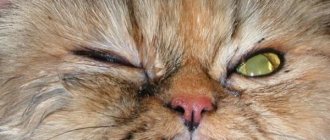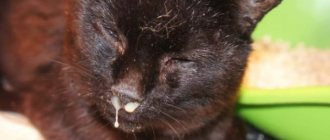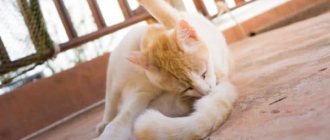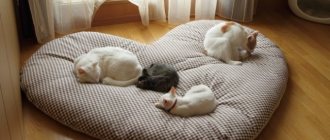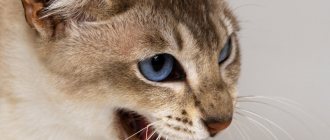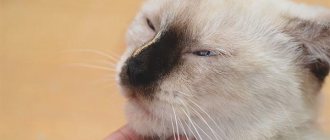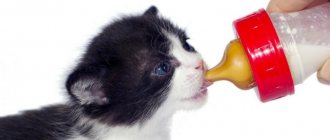Signs of a healthy cat are activity, a well-groomed appearance and a good appetite.
If the animal has stopped eating, you should be wary and find out why your pet is refusing to eat.
Most cats are picky; if they don’t like the food (smell, taste, consistency), they may deliberately not eat food for several days, waiting to receive the delicacy.
Sometimes a lack of interest in food is observed when the animal is unwell due to changes in weather conditions and atmospheric pressure (weather dependence, especially in older individuals), in other cases - after suffering stress (a trip, separation from the owner, a new pet in the house, pain or fear).
But most often this is associated with an acute or chronic disease, so a thorough examination is necessary.
Why might a cat refuse to eat?
A cat can refuse to eat for an incredible variety of reasons. Most diseases can begin with this common symptom.
If your cat has one of the following signs, then you better go to the veterinarian without delay:
- lethargy
- increase in body temperature
- vomit
- diarrhea
- constipation
- difficulty urinating or no urination at all
- discharge from the nose and/or eyes
- open mouth breathing (“like a dog”)
The reasons that a cat is not eating are not necessarily related to illness. Lack of appetite in cats can be influenced by various factors:
- The cat has already eaten))). Check to see if he ate something secretly from you, or if he opened the door of the cabinet or even the refrigerator. This also happens. Cats can be very inventive and persistent in their desires. Interview relatives - perhaps someone has already fed the pet.
- Any change in the type and quality of feed. Cats are often very sensitive to the composition of food, its consistency, temperature, and smell. And even with a small change, they may not touch the food. Sometimes it can even be the same ready-made food, but from a new pack. Or the same food, but with a slightly different taste. Or instead of a can of jelly, you bought pate. Not to mention homemade food, where it is impossible to keep the ingredients identical. Therefore, think about what might have changed over the last 1-2 days in your pet’s diet. The transition from one type of food to another should be carried out gradually, over 7-10 days, by mixing the new food with the old one.
- Changing the external environment in the apartment. Has the bowl been moved to a place that is not comfortable for the cat? Have they placed something unusual in the place where the cat prefers to eat (a large bag, a broom).
- Stress. Cats are very sensitive to stressful situations: traveling with them somewhere, the arrival of strangers in the house, the appearance of a robot vacuum cleaner, even the smell brought on clothes can provoke a reaction from the mustachioed pet and lead to a decrease or lack of appetite.
- Features of sexual behavior. During the period of active sexual hunting, both male and female cats may experience a decrease in appetite. The reproductive instinct overcomes basic physiological needs
